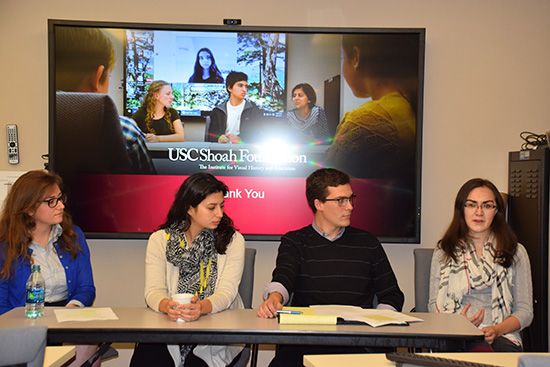USC Shoah Foundation Hosts Faculty Workshops for USC Diversity and Inclusion Week

"United Through Pain and Hope" panel discussion with USC Shoah Foundation interns from left: Ilana Rabin, Maria Lattouf Abou Atmi, Zach Larkin, Alison Eling
USC Shoah Foundation participated in the University of Southern California’s first Diversity and Inclusion Week by offering a series of workshops for faculty on Monday, Jan. 23.
Diversity and Inclusion: Dilemmas and Opportunities is sponsored by the USC Office of the Provost. It will host a variety of seminars, training sessions, and roundtables over the course of the six days. The goal is to provide faculty with outlets for discussion and exercises designed to develop the skills and resources they need to better address diversity and inclusion in various contexts –in the classroom, in mentoring situations with students and colleagues, and in recruitment, hiring and promotion.
Training will cover a variety of domains including race, disability status, sexual orientation, immigration status, nationality and gender identity and will take a variety of forms including student-sponsored sessions and professional development exercises. There will also be opportunities for faculty to hear about the exciting research and scholarship faculty and staff at USC have produced to advance national conversations on diversity.
USC Shoah Foundation Executive Director is co-chair of the USC Campus Climate Committee, which identifies effective approaches to cultivating a culture of equity, inclusivity, and respect that enhance the success of all faculty within a pluralistic context.
On Monday, faculty were invited to participate in three workshops in USC Shoah Foundation’s office in Leavey Library as part of Diversity and Inclusion week activities.
First, Director of Education Kori Street led “’Skittles,’ ‘Deplorables’ and ‘All Lives Matter.’” In this session Street investigated how to navigate the language of social division through testimony-based learning. This session examined the larger external influences that construct how educators must navigate different learning environments, and how to make sense of and deconstruct information sources.
Next, USC Shoah Foundation student interns participated in the panel discussion “United Through Pain and Hope,” led by Ilana Rabin, master’s candidate in communication management and nonprofit management and intern at USC Shoah Foundation.
The panel included interns Maria Lattouf Abou Atmi (collections department), Zach Larkin (executive office), and Alison Eling (communications department). They spoke about what they have learned through testimony in the Visual History Archive about the importance of acceptance as well as their thoughts about how USC has handled issues of diversity and inclusion on campus.
Eling said a clip from the testimony of Kurt Messerschmidt has had the biggest impact on her. In the clip, Kurt describes how he and a friend helped a Jewish shopkeeper pick up shards of glass after Kristallnacht, while a crowd of onlookers did nothing.
“It’s so powerful because that could have been so different if somebody stood up for him and said no, that’s not right, you shouldn’t be doing this,” Eling said. “That really stuck with me because especially in current times with people doing marches that influence changes in politics, if we didn’t stand up for ourselves or other people we wouldn’t be making change like we have in the past, and we need to keep doing that.”
For Atmi, testimonies about people who helped others who were in danger despite risks to their own safety are particularly inspiring.
“It’s very easy to talk about making a difference and doing something important when it’s not you that’s personally affected, when you have a position of privilege or you’re not personally required to do anything,” she said. “But to make a change that affects your life and has deep consequences, that’s something incredible and necessary and worthwhile.”
Larkin noted that while people often tout “tolerance” as the gold standard, he feels we should actually strive for coexistence – not merely tolerating people who are different from us, but actively working to protect and include them.
“Coexistence is about being on more of an equitable level,” he said. “Inclusion to me means making a deliberate effort to address unconscious status differences in order to provide a true equitable and just coexistence.”
The last session of the day was “Learning Our Way Out of Hate,” led by Stephen Smith and Claudia Wiedeman, Associate Director of Education for Educational Technologies and Training. This session focused on the power of audiovisual testimony from the Institute’s Visual History Archive to engage students in learning and its capacity to positively affect attitudes and behaviors.